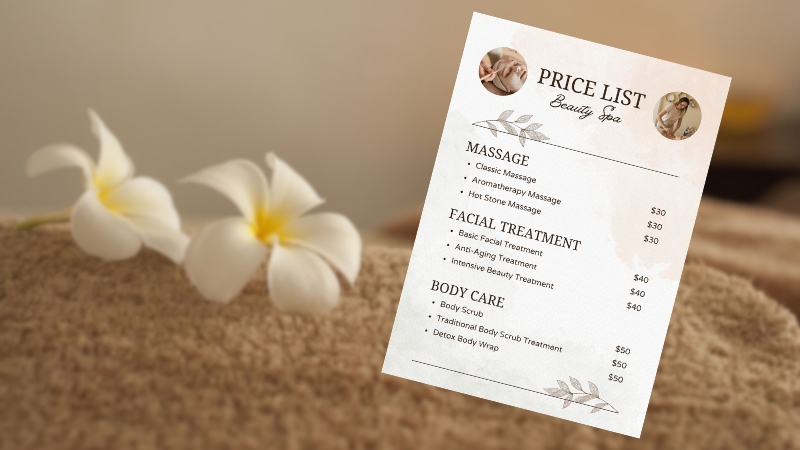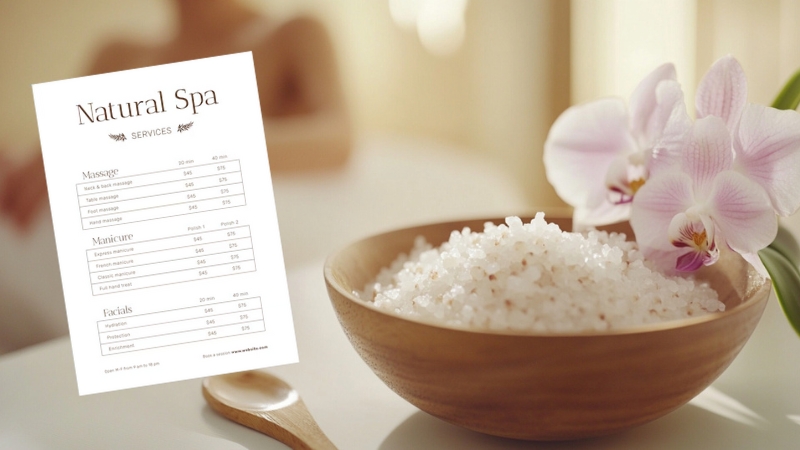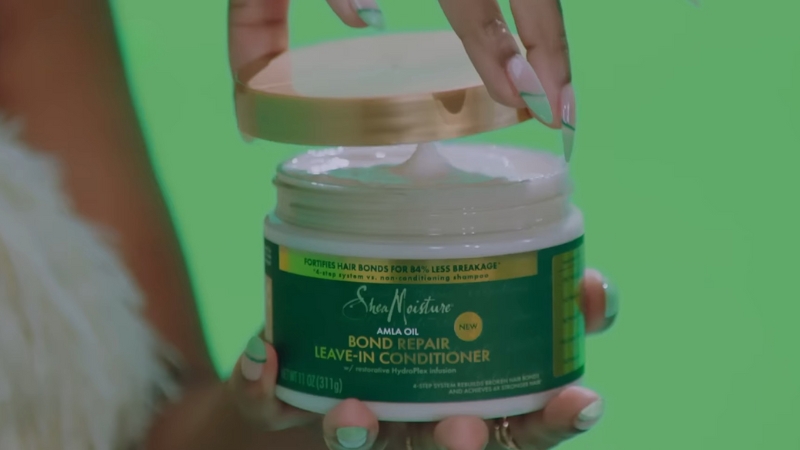
Share Post:
Running a spa calls for more than plush robes and soothing music. An eye-catching and functional pricing layout can make all the difference for potential guests.
Below, I’ve prepared a roadmap to steer clear of twenty frequent errors that can harm a spa’s reputation. A few small tweaks may propel a business into a higher league, strengthening both trust and profitability.
1. Lack of Clarity and Organization

A messy price list can push prospective guests away before they ever book an appointment. Group-related services under logical categories, such as massages, facials, body treatments, and special packages.
Use headings and bullet points for improved readability. Keep the structure consistent, with uniform font sizes and styles, to guarantee a cohesive presentation.
- Group services into distinct sections (e.g., Swedish massage, Hot Stone massage)
- Use subheadings and bullet points for quick scanning
- Apply identical formatting across all categories
2. Overcomplicating Service Descriptions
Voluminous paragraphs can overwhelm folks, especially when they’re pressed for time. Too many details about each treatment’s methods and ingredients might be distracting.
Keep it simple by highlighting key benefits and unique selling points. A shorter explanation that focuses on the main features often captivates readers more effectively than a drawn-out essay.
When simplifying service details, consider using resources such as a ChatGPT detector to confirm the originality and human-like tone of your content.
- Emphasize time length, core benefits, and notable extras
- Adopt a conversational tone that feels authentic
- Encourage curiosity by weaving in a hint of the luxurious experience
3. Inconsistent Pricing
Noticeable price disparities or fees that don’t align with treatment times can raise eyebrows.
A massage that lasts 60 minutes should generally fall in line with other 60-minute sessions in cost, adjusted for special add-ons or brand exclusivity.
Conduct regular reviews of fees to confirm that everything remains competitive and transparent.
- Keep similar service durations in the same range
- Justify higher rates with distinctive perks
- Re-evaluate fees periodically to maintain profitability and appeal
4. Neglecting Visual Appeal
Words alone may not be enough to stand out. Artwork, colors, and brand elements add warmth and harmony to each section of a spa price list.
An appealing structure allows the eyes to flow naturally from one section to another, encouraging readers to linger and explore services further.
- Integrate brand colors, logos, and fonts
- Use high-quality images or icons to distinguish sections
- Maintain plenty of white space to avoid clutter
5. Omitting Essential Information

Many folks want to know how long a treatment lasts, possible package deals, or policies related to cancellation.
Leaving out details fosters confusion and frustration, which might lead potential guests to hunt for alternative spas.
- Indicate exact durations and prices for every service
- Add terms for late arrivals or cancellations
- Highlight any loyalty rewards or referral programs
Offering transparent guidelines sets clear expectations and can reduce miscommunication down the line.
6. Ignoring Digital Accessibility
Plenty of clients now rely on digital devices for browsing options on the go. A mobile-friendly price list is practically mandatory.
Showcase your signature services on a digital business card that staff can share via text or email during consultations, helping clients remember your spa’s unique offerings while providing an immediate booking option that distinguishes your establishment from competitors.
Readable fonts and a user-friendly layout are vital, as is a PDF or printable version for those who prefer a hard copy.
- Optimize text and images for smartphone screens
- Check loading times and ensure the file size isn’t massive
- Include clickable links for booking or further information
7. Failing to Highlight Signature Services
Our spa services price list ensures you can plan your beauty treatment expenses ahead of visiting the spa 💜For now you can find it under the price list highlight on IG. You can also save this tweet as a book mark. pic.twitter.com/E98FzKO4Nv
— Dermaspace.ng (@DermaspaceN) May 9, 2019
A unique offering can help a spa stand out among dozens of competitors. Signature treatments, designed to leave guests with a memorable experience, warrant special placement on a pricing sheet. Feature them prominently so prospective clients notice them immediately.
- Place flagship services at the top of relevant sections
- Incorporate a short slogan or tagline that captures their essence
- Reinforce how those treatments are exclusive
8. Overlooking Seasonal Promotions
Rotating promotions and themed specials inject fresh energy into an establishment.
Discounts for holidays or limited-time packages can spur sudden interest, especially when clearly stated with an end date.
- Label promotions in a bright color or with an eye-catching icon
- Include a countdown or “only available until…” note
- Update periodically to reflect new events or seasonal changes
9. Not Seeking Client Feedback

Every visitor is a treasure trove of insights. Honest remarks about layout clarity, content, and design can reveal hidden issues or highlight strengths that might have been overlooked.
Ask for opinions after treatments or through online surveys.
- Place a short link on the price list encouraging suggestions
- Offer a small discount for helpful feedback
- Keep an open mind to changes based on recurring comments
10. Disregarding Competitor Analysis
Competition can be revealing. Keeping an eye on rivals’ pricing and layout strategies helps shape a spa’s approach. Observing how local players bundle or discount services may prompt fresh ideas.
- Compare service categories and prices from leading competitors
- Examine promotions that produce significant client interest
- Revisit decisions if a competitor strategy appears more effective
11. Neglecting Legal and Ethical Considerations
All posted information must comply with local guidelines and rules. Transparent disclaimers regarding expected results, potential side effects, or mandatory disclaimers in specific areas keep operations squeaky clean.
- Note any necessary medical disclaimers for special treatments
- Confirm that the stated prices match the final charge
- Comply with advertising regulations related to spa services
12. Failing to Train Staff on Pricing Details

Employees serve as brand ambassadors. If team members can’t confidently discuss service costs and highlights, guests may second-guess their decisions. Regular staff development sessions make a huge difference.
- Provide updated price sheets during staff meetings
- Engage in role-play to hone sales and customer service skills
- Encourage staff members to share client questions and feedback
13. Overloading with Too Many Options
An endless menu may leave potential guests feeling confused.
Limit offerings to high-demand or signature treatments. If an extensive menu is necessary, consider grouping them in a way that feels intuitive.
- Organize treatments into logical categories
- Focus on core services that generate the most bookings
- Phase out lesser-used treatments to maintain a concise roster
14. Not Updating the Price List Regularly
Few things frustrate guests more than outdated information. Incorrect pricing or discontinued services can lead to misunderstandings and disappointment. Keep materials fresh.
- Schedule recurring audits to confirm the accuracy
- Refresh seasonal promos and new treatments promptly
- Remove or adjust any service that no longer fits the menu
15. Ignoring the Importance of Design Consistency
@ninetyninedesign Price list designs 😍 #graphicdesign #branding #girlybranding #graphicdesigner #graphicart #graphiccontent #pricelist #businesscards #loyaltycards #brandinginspiration #brandingdesign #brandingidentity #logodesigner #logodesign #socialmedia #template #socialmediamarketing #instagramtemplate #storytemplate #graphicdesign #nudelogo #goldfoiling ♬ original sound – Ninety Nine Design / Livvy
Every form of marketing, from social media posts to brochures, should present a unified brand identity.
A price list deserves equal attention. Fonts, colors, and layout choices must align with what the spa’s audience recognizes.
- Apply consistent color schemes and typography
- Align images or icons with broader advertising materials
- Maintain repeated branding elements to reinforce recognition
16. Overlooking the Use of Testimonials or Reviews
Praise from genuine customers often builds trust faster than any advertisement. Brief testimonies placed near relevant services can spark curiosity and reduce doubt.
- Request quotes from loyal visitors about their experiences
- Feature a short snippet that showcases how a service feels
- Respect privacy by only sharing first name or initials, as allowed
17. Not Providing a Clear Call to Action
Interest in a service is fantastic, but an easy way to proceed is necessary. Guiding readers toward booking details or contact information shortens the path between curiosity and action.
- Include a short phrase such as “Reserve an appointment now”
- Provide phone numbers and online booking links in bold font
- Display contact channels at both the beginning and end of the list
18. Failing to Consider Psychological Pricing Strategies
Subtle tactics can influence how folks perceive a price. A treatment costing 99 dollars instead of 100 can appear more affordable.
Small numerical shifts in marketing copy sometimes play a role in boosting sales.
- Opt for 89, 99, or 119 price points instead of rounded figures
- Offer package discounts that look valuable by comparison
- Make sure those strategies reflect genuine cost savings
19. Not Tailoring Services to Target Demographics
Guest preferences can vary by age group, region, or cultural influences. Adjusting offerings to fit that variety helps fill schedules more effectively.
- Design packages for seniors, busy professionals, or couples
- Consider local tastes in spa culture or community trends
- Survey returning guests about potential new ideas
20. Overlooking the Importance of Proofreading
Typos and grammatical errors can create a negative impression. A quick glance for spelling mistakes or awkward phrases can make a world of difference.
- Enlist a trusted friend or colleague to review the text
- Read content aloud to catch stilted or repetitive wording
- Double-check crucial numbers and disclaimers
Final Thoughts

A well-designed pricing blueprint does more than inform guests of costs; it sets a tone for everything else. By avoiding those widespread missteps, a spa can project professionalism, ensure a smooth booking process, and build lasting relationships.
A calm and inviting environment begins long before anyone steps through the door. Showcasing services, packages, and promotions in a thoughtful way speaks volumes about a spa’s commitment to guest well-being.
A well-planned price list can elevate an establishment into a sanctuary guests will eagerly revisit—and recommend to others.
Related Posts:
- 17 Common Skincare Mistakes That Can Ruin Your Routine
- What Do You Do at a Spa? Your Complete Guide to a…
- How to Plan the Perfect Surprise Spa Weekend for…
- Top 8 Luxury Spa Resorts in America You Must Try in 2025
- 10 Best Small Touches to Wow Spa Clients Every Time
- How Do You Choose the Right Spa for Post-Treatment Recovery?











